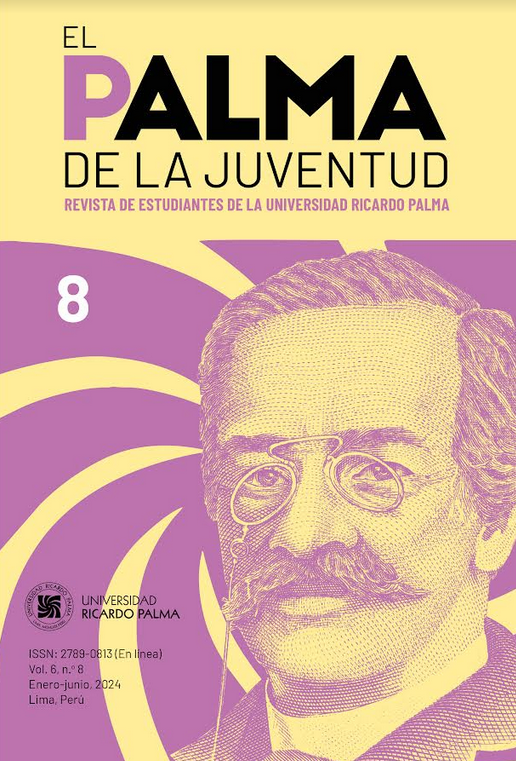The discourse of lack and the representation of the writer’s conflicts in times of political turbulence in «El lamento del sargento de Aguas Verdes» («The lament of the sergeant of Aguas Verdes») and 2046
DOI:
https://doi.org/10.59885/epdlj.2024.v6n8.08Keywords:
2046, Ave Soul, lack, writerAbstract
This article will explore how the discourse of deprivation runs through the configuration of the writer character in the poem «El lamento del sargento de Aguas Verdes» («The lament of the sergeant of Aguas Verdes» (1974), by Jorge Pimentel, and in the film 2046 (2004), directed by Wong Kar-wai. The selected texts comprise the representation of writing characters whose life experiences related to deprivation differ from one another, affected by gender, race, social class, culture and socio-political context. The aim of this paper is to find points of comparison, in that it identifies constancies in the types of conflicts faced by the writers and understands the impact that the aforementioned points of divergence may have on how deprivation and its consequences are dealt with. It is proposed that there is a constancy of economic deprivation that underpins the repetition of the act of writing, and also the total dependence of the writer, who suffers from deprivation, on the means of publication and dissemination of his work. This dependence makes him vulnerable to a demand that can lead to the mechanisation of his work and, therefore, to the dehumanisation of the writing subject. For this purpose, the Semiotics of discourse (2001) by Jacques Fontanille and the Semiotics of the filmic text (2003), proposed by Desiderio Blanco, will be used in such a way that, on the basis of the tensions, it will be possible to establish a semi-symbolic relationship that shows the intention of a particular treatment of the conflicts of each writer character and, in the same way, a series of similarities despite the differences of expression in their respective media.
References
Asensi, M. (2010). La oveja perdida y la emancipación de la literatura comparada. En J. Morales (comp.), La trama teórica. Escritos de teoría literaria y literatura comparada (pp. 79-95). Editorial San Marcos.
Blanco, D. (2003). Semiótica del texto fílmico. Fondo Editorial de la Universidad de Lima.
Canet, F. (2008). En busca del tiempo perdido: la bipolaridad narrativa de Wong Kar-wai en 2046. ZER, 13(24), 237-256. https://ojs.ehu.eus/index.php/Zer/article/view/3622
Chávez, E. E. (2014). Encuentros del tipo vanguardista: Magda Portal y Jorge Pimentel (una perspectiva de género) [tesis de licenciatura; Pontificia Universidad Católica del Perú]. http://hdl.handle.net/20.500.12404/5756
Dammert, J. E. (2017). Destruir para destruir: la narrativa del cambio social en la poesía de Jorge Pimentel [tesis de licenciatura; Pontificia Universidad Católica del Perú]. http://hdl.handle.net/20.500.12404/10272
Fontanille, J. (2001). Semiótica del discurso. Universidad de Lima.
Kar-wai, W. (Director). (2004). 2046 [película]. Block 2 Pictures; Paradis Films; Orly Films; Jet Tone Production.
Nakama, J. (2009). Time after time: exploring temporality and identity in Wong Kar-wai’s Days of Being Wild, In the Mood for Love, and 2046. PSU McNair Scholars Online Journal, 3(1), artículo 18. https://doi.org/10.15760/mcnair.2009.127
Pimentel, J. (2018). Ave Soul. Alquimia Ediciones.
Ramírez, J. A. (2016). Ave Soul: Hacia un franco y verdadero proceso de ruptura. La construcción de un nuevo sujeto en la poesía de Jorge Pimentel [tesis de licenciatura; Pontificia Universidad Católica del Perú]. http://hdl.handle.net/20.500.12404/7220
Downloads
Published
How to Cite
Issue
Section
License
Copyright (c) 2024 Maryori Alma Herrera Castro

This work is licensed under a Creative Commons Attribution 4.0 International License.
La revista utiliza una licencia Creative Commons para mostrar a los lectores y usuarios cómo se pueden utilizar los contenidos publicados.
Los contenidos publicados en esta revista están bajo una licencia CC-BY 4.0. Esta licencia permite:
- Compartir, copiar y redistribuir el material en cualquier medio o formato.
- Adaptar, remezclar, transformar y construir a partir del material para cualquier propósito, incluso comercialmente.
Bajo los siguientes términos:
- Atribución. Usted debe dar crédito de manera adecuada, brindar un enlace a la licencia, e indicar si se han realizado cambios. Puede hacerlo en cualquier forma razonable, pero no de forma tal que sugiera que usted o su uso tienen el apoyo de la licenciante.










